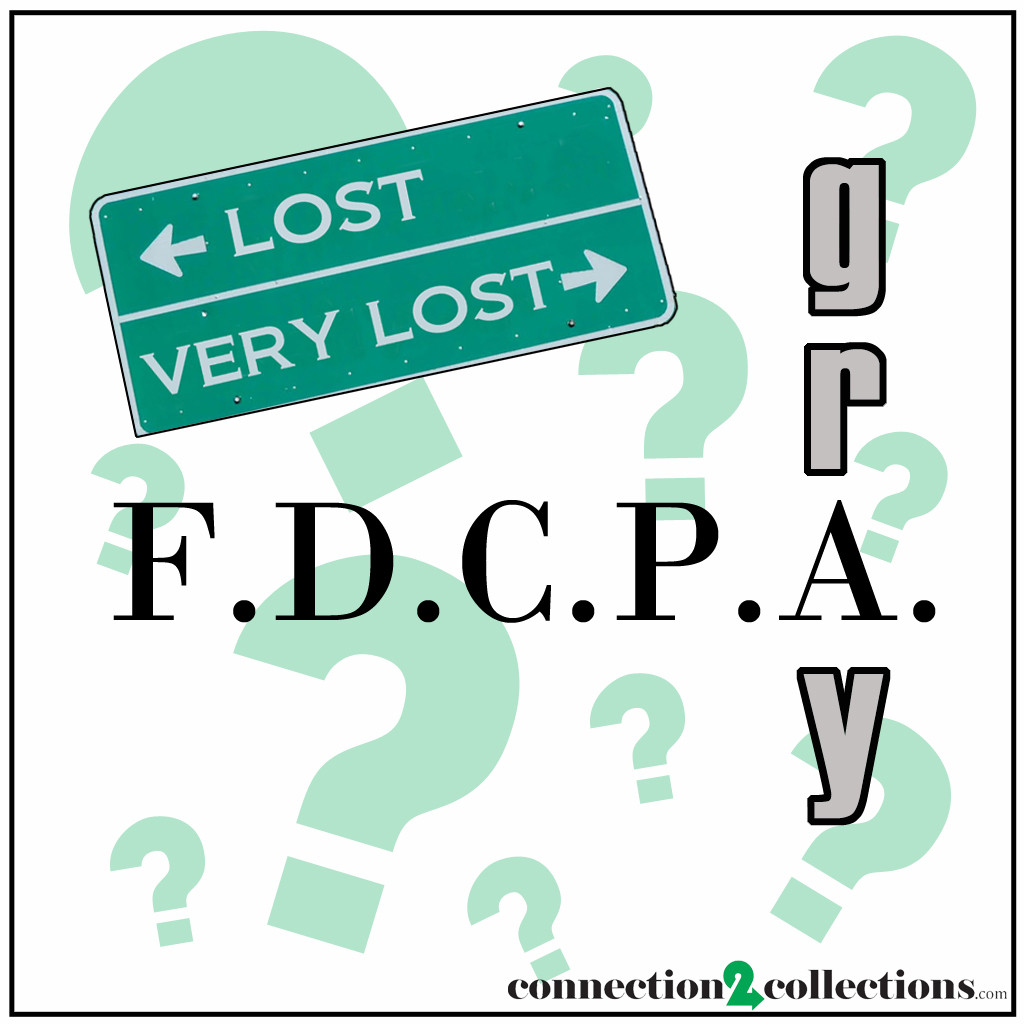
Good Old Gray, F.D.C.P.A.
Have you ever sat in a staff meeting or a training session discussing a new policy that was written for the collectors because of a new lawsuit under the FDCPA (Fair Debt Collection Practices Act)? I mean, you can’t blame your managers and your clients for wanting you to be prepared for every situation. Every time a debtor logs online, they get one of these in their face:

Good Old Gray, FDCPA.
It’s funny how the internet has turned into a place where debtors now go online and think that they not only can escape their liability from their debts, they can make money off of them by suing you for calling them to collect it. What debtor attorneys seem to be doing, is taking advantage of an outdated and GRAY FDCPA. We will dedicate an entire post to debtor attorneys, and it will be good. So hold your comments about them until we have a chance to share our thoughts :).
Anyways, back to what we were saying. Debtors are very aware of their rights these days. And quite frankly they SHOULD be. Collectors should be doing their jobs responsibly. And they should obey the law. If you break the law, you’re only making it worse for everyone. Every time a collector gets sued and it goes to trial, a new “judge made” law is put in place. That’s when all these changes come down the pipeline and new policies get put in place. Here’s the thing though. Even the best and most compliant collectors can still get caught up in an FDCPA violation. To be perfectly honest, a lot of collectors are losing their jobs for violations that aren’t really forms of egregious misconduct.
For example:
Within the FDCPA a collector violates the statute if they disclose information to a third party. This third party disclosure can subject the collector and the company they work for to statutory damages under the FDCPA. HOWEVER, there is a case known as the Foti case. In this case, the court ruled that when a debt collector leaves a message on a debtor’s voice mail, they must; ” include the mini-miranda and a meaningful disclosure of the debt collector’s identity.”[1]
![]()
To Foti, or not to Foti? That is the question.
There’s a problem with that because it leaves the potential for third party disclosure if it’s left on a home answering machine, or if the debtor lent their phone to a friend or family. So debt collection shops everywhere had to choose, To Foti, or not to Foti? That is the question… But it doesn’t end there. The FDCPA was established in 1977. Yeah, 1977! And it hasn’t been redone since then. If you think that a law that’s almost 40 years old, isn’t that old, well think about how much has changed since the late 70’s.
First off, text messaging and email messaging wasn’t around yet. So there are the two most popular forms of communication not even covered by the law. Not only that, but cellular phones weren’t very popular in the 1970’s either. And the home phone is practically long gone these days. Maybe your parents have one.
We’re not here to say that the FDCPA should go away. But how are people supposed to follow a law that some would argue, can’t be followed. That’s not to say that the harassment issues, disclosure issues, and validation notices aren’t an important part of the collection process, but the industry is heading in the direction of collection ONLY by sending paper mail. Now, that’s a stretch, but there are creditors out there who won’t let their collectors make phone calls. [YIKES!]
This is a bad thing for both collectors and consumers, but more so for consumers.
Collectors will never go away, we can’t. Credit can’t exist if collections goes away. If you have no way to enforce your contract or judgment, how will you take the risk of lending money or extending credit? Creditors could then just decide to NOT lend money to high risk borrowers, and then sue everyone who is in default. If they can’t call, and they can’t collect, then they will not lend to people who won’t pay, and sue the people who don’t pay. Also, the law eliminates the convenience for consumers in default. One of the most difficult aspects of dealing with debt is talking to collectors. Consumers don’t like to deal with it for various reasons. If you take away the ability to email/text/leave messages, then you create a situation where a collector will have to keep calling until they can get you on the phone.
The collectors have it the worst. Serious FDCPA violations can get a company fired by a client, but minor violations can cost a collector their job. With policies changing almost daily, it’s not surprising that collectors are getting frustrated. With the newly formed CFPB, hopefully someone will draw a line in the sand. Both collectors, and consumers will be better off if there are clear rules and regulations. The only people who will suffer are the debtor attorneys who can’t take advantage of minor technicalities. Sure, collectors who are blatantly violating the law should be fired and companies who are allowing illegal collection tactics should be sued. We don’t support or condone that type of business because it hurts the industry. However, when you have case law that contradicts the legislation, you get a lot of confused collectors and attorneys who don’t know what to tell their clients.
![]()
Hopefully some clarity will come soon, for now, as collectors you need to do your best to play it safe.
What you think will make a small difference by saying a little too much on a message can cost you your job, and it may even get you featured on Dateline NBC, so be careful and ask questions. If you don’t know, don’t go. Just ask for help!
Visit Connection2Collections for more.
[1] 15 U.S.C §1692e(11) requires, among other things, a disclosure that the communication is from a debt collector. This is commonly referred to as the “mini-miranda.", 15 U.S.C. §1692d(6) prohibits “Except as provided in section 804 [skiptracing], the placement of telephone calls without meaningful disclosure of the caller's identity.
3 Comments
Leave a Reply
You must be logged in to post a comment.


Tara - September 17, 2014, 4:23 pm
Fantastic article! I love the point that if traditional collections (calling on the phone) goes away, it is just going to limit the consumer’s ability to resolve the debt prior to litigation! As pointed out, the FDCPA and the many other statutes and legislation are completely gray… it is so hard to run a collections practice when you are flying blind…we are damned if we do and damned if we don’t. So even if the CFPB brings stricter rules, that’s fine with us, even welcomed, we just want to know what the rules are!
Connection2Collections - September 17, 2014, 5:24 pm
Glad you enjoyed it! This is exactly what we are worried about. The more informed our industry is on the negative side effects of no clear “line in the sand” then we are left “flying blind”! Thanks for the feedback Tara!
Tara - September 19, 2014, 4:58 am
I think it’s important to note as well, especially in Foti, that other states contradicted that ruling, for instance California stated they must leave the mini miranda IF they know FOR CERTAIN the person lives alone. What? Florida-it ruled for and against Foti in two different cases. Not to mention state’s that have developed their own FDCPA such as CA, CO, OK etc. The states are being more proactive than the government. When the CFPB was created, the FTC passed the FDCPA torch to them. CFPB has put out white paper for consumers -with specific instructions on requesting copious amounts of information from creditors/3rd party vendors, without thoroughly explaining the difference between cease contact and dispute. In addition, the law does not require all of this information to be handed over to a debtor. The internet did not give reason for the government to enhance and revise the FDCPA, it gave resources for debtors and even government entities to educate consumers on how to get out of debt rather than educating them on how to be financially responsible, and the best methods to working with collectors. Sure-I agree, there will always be rogue agencies who make the industry look bad, but for the ones trying to do the right thing, it’s hard when the law has not been updated, and the only ones focusing on the right thing are the compliant collectors.